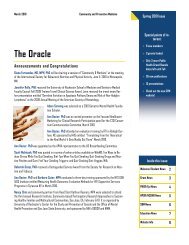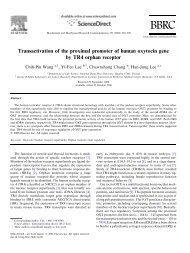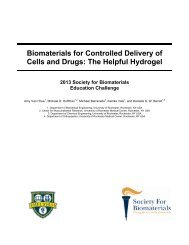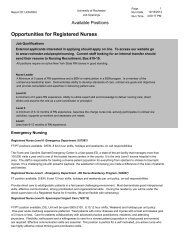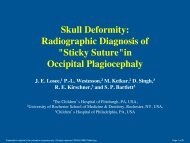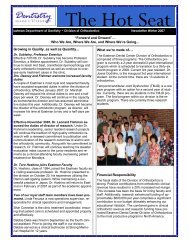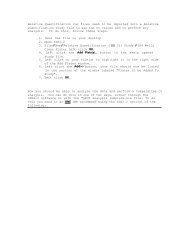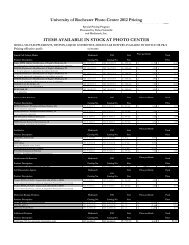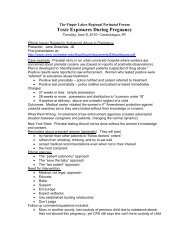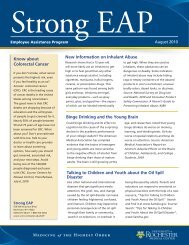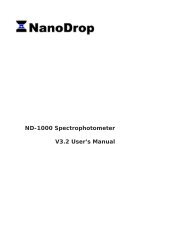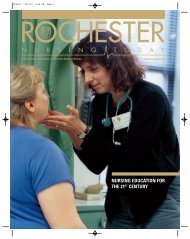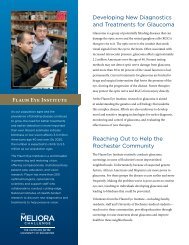Fall/Winter 2006 - University of Rochester Medical Center
Fall/Winter 2006 - University of Rochester Medical Center
Fall/Winter 2006 - University of Rochester Medical Center
Create successful ePaper yourself
Turn your PDF publications into a flip-book with our unique Google optimized e-Paper software.
worried about the impact <strong>of</strong> the large debt<br />
faced by most medical students today. So he<br />
added significantly to his contribution to the<br />
Scholarship Initiative<br />
Glen H. Kumasaka, M.D. (M’55), recently<br />
donated $25,000 to the Initiative to launch<br />
a family scholarship that he hopes will grow.<br />
“<strong>Rochester</strong> has been such a great place<br />
for me and my family,” said the retired radiologist,<br />
who lives in Ann Arbor, Mich.<br />
That’s a remarkable assessment for<br />
Kumasaka, who arrived in the city <strong>of</strong><br />
<strong>Rochester</strong> in 1945 in the wake <strong>of</strong> a tragedy<br />
for his family — their internment in the Tule<br />
Lake Camp in California during World War II.<br />
Kumasaka grew up in Tacoma, Wash., where<br />
his family operated a fruit and flower market.<br />
But after the start <strong>of</strong> the war, the government<br />
swept Japanese-Americans into camps,<br />
opening Tule Lake in May 1942.<br />
The government finally released the families<br />
from the Tule Lake camp after the war<br />
ended. Kumasaka’s father, who stressed<br />
education to his children, chose <strong>Rochester</strong> on<br />
the advice <strong>of</strong> a counselor who recommended<br />
the <strong>University</strong>’s Eastman School <strong>of</strong> Music for<br />
his daughter, Kumasaka’s older sister who<br />
was a pianist and singer. When they arrived<br />
in the <strong>Rochester</strong> area, there was only one<br />
other Japanese family.<br />
The sister graduated from Eastman. And<br />
Kumasaka graduated from <strong>Rochester</strong>’s East<br />
High School and then Harvard <strong>University</strong><br />
before returning to <strong>Rochester</strong> and the School<br />
<strong>of</strong> Medicine. He remembers the welcome<br />
given to his class by the then dean, George<br />
Hoyt Whipple.<br />
“He told us he knew we could do the job<br />
and that he expected everyone to be good<br />
physicians. He said the School invested in us<br />
to become caring physicians,” said Kumasaka,<br />
who received a scholarship to attend the<br />
School. “No one has such a warm memory<br />
<strong>of</strong> their medical school as I do. It is one <strong>of</strong> the<br />
greatest schools in the country. I feel so gratified<br />
and proud <strong>of</strong> going through <strong>Rochester</strong>.”<br />
Continued on page 69<br />
New research development<br />
fund honors Engel<br />
The <strong>University</strong> <strong>of</strong> <strong>Rochester</strong> <strong>Medical</strong> <strong>Center</strong>’s<br />
Department <strong>of</strong> Psychiatry has launched a fund<br />
to honor the work <strong>of</strong> George L. Engel, M.D.,<br />
whose biopsychosocial medical model influenced<br />
generations <strong>of</strong> physicians.<br />
Engel, a pr<strong>of</strong>essor <strong>of</strong> medicine and psychiatry<br />
who joined the <strong>Rochester</strong> faculty in 1946,<br />
published an article in the journal Science<br />
in which he detailed his concept <strong>of</strong> the<br />
biosychosocial model and challenged the<br />
traditional model, writing “the traditional<br />
model leaves no room within its framework<br />
for the social, psychological, and behavioral<br />
dimensions <strong>of</strong> illness.” He died in 1999.<br />
The Department <strong>of</strong> Psychiatry is establishing<br />
the fund to foster the efforts <strong>of</strong> faculty<br />
members throughout the <strong>University</strong> <strong>of</strong><br />
<strong>Rochester</strong> <strong>Medical</strong> <strong>Center</strong> during the early<br />
stages <strong>of</strong> their careers. It will provide money<br />
for innovative pilot research efforts. The<br />
target areas are:<br />
George L. Engel, M.D.<br />
• Theoretically driven research that seeks to<br />
understand the integrated effects <strong>of</strong> life<br />
events and personal characteristics on human<br />
development, biological systems and mechanisms<br />
<strong>of</strong> action, and disease expression or<br />
the promotion <strong>of</strong> health.<br />
• Theoretically driven research that uses<br />
innovative, multidisciplinary methods to<br />
design, implement, and evaluate new strategies<br />
for preventing or ameliorating mental<br />
distress and disorders based upon current<br />
understanding <strong>of</strong> how psychological, biological,<br />
family, social, economic, and cultural risk<br />
and protective factors apparently contribute<br />
to health and illness.<br />
The fund will distribute grants on an<br />
annual basis. Pilot projects supported by the<br />
fund are expected to lead to additional peerreviewed<br />
research endeavors.<br />
For more information on the George L.<br />
Engel Research Development Fund, contact<br />
Amy N. Bouchard, chief development <strong>of</strong>ficer<br />
for the Department <strong>of</strong> Psychiatry at 585-273-<br />
5935 or abouchard@admin.rochester.edu.<br />
FALL / WINTER <strong>2006</strong> 43



